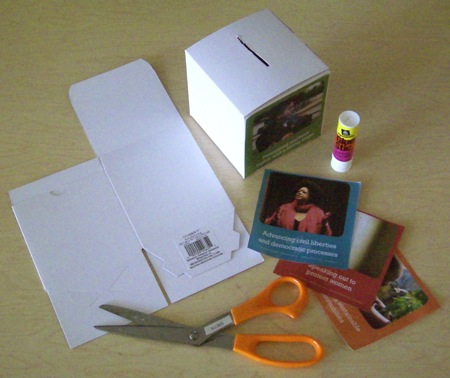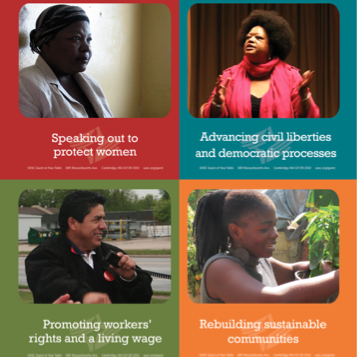Amy, the senior minister at our church, had to tell me what a pushke is. “Pushke” is a Yiddish word for a little box that you keep in your house into which you can place money that is to be donated to charity. I didn’t grow up Jewish, and we just called them money boxes; but I think pushke is a much better word.
Up until this year, the Unitarian Universalist Service Committee used to send out little boxes to support their Guest at Your Table program. Every year on the Sunday before Thanksgiving, families would come to Sunday services, pick up their Guest at Your Table box — their Guest at Your Table pushke, if you will — and bring it home to put on their kitchen table. Then during the weeks between Thanksgiving and Christmas or New Year’s Day, kids were supposed to put a little money in the box each day. Towards the end of December, families would count up the money they had deposited in the box and the grown-ups would add something to round it up to the nearest ten or twenty dollar mark. On the Sunday before Christmas, all the families would bring their pushkes full of money to be collected at the service, and the congregation would send it all to the UUSC.
This year, the UUSC decided it wasn’t going to send out Guest at Your Table boxes any more. I can understand why they made this decision. Each of those boxes must cost the UUSC a dollar or so; better to spend money on helping people, rather than on Guest at Your Table boxes.
However, I found an interesting informational paper written by Jennifer Noparstak, a graduate student of social work at the University of Michigan. She writes that in the Jewish tradition, pushkes help teach young people about giving and philanthropy. Pushkes teach the importance of anonymous donations: “Anonymous donation maintains a dignified relationship between those who are giving and those who are receiving aid.” Pushkes teach the importance of community in giving: “[The pushke] is also important because it signifies a community effort to aid people who need it and may not be able to ask for it directly. The pushke serves as a means for each member of a household to contribute, both children and adults alike, fostering the importance of giving among all age groups.” And, perhaps most importantly, pushkes cultivate the habit of charitable giving: ” It is considered more credible to develop a habit of giving regularly rather than giving large sums infrequently.”
Here in our congregation, we decided that even though the UUSC isn’t going to make Guest at Your Table boxes any more, it was important for us to provide Guest at Your Table pushkes for our families. Our Guest at Your Table Coordinator, Beth Nord, found plain white gift boxes that are the same size as the old Guest at Your Table boxes (look for 4x4x4″ gift boxes, sometimes sold as gift boxes for coffee mugs; Beth bought ours at Michaels, an arts-and-crafts chain store). We printed out images from the UUSC, sized so they would fit onto the sides of the pushkes — like this:
You cut out the four pictures, take one of the plain white gift boxes, glue one picture to each of the four sides, cut a slot in the top for money, and there you have it — your very own Guest at Your Table pushke. Here’s one in the process of being made:

This morning during the service, Amy explained where the Guest at Your Table money goes to, while I showed how to make a pushke. After each service, kids came with great enthusiasm to pick up boxes and pictures to take home so they could make their own pushkes. This is the most enthusiasm I’ve ever seen for the Guest at Your Table program!
So the UUSC gets to save money, our kids are more enthusiastic about the Guest at Your Table program, and we continue to provide pushkes to help teach kids about giving anonymously, giving communally, and getting in the habit of giving a little bit every day to charity.


I Love this idea! Our congregation had a surplus of boxes, so we simply used those this year, and our minister proposed that we keep and recycle them in future years, but I am going to suggest this project as an alternative. I agree that it will serve to engage the children in the program, and get them excited about giving. Thanks!
~C.C.